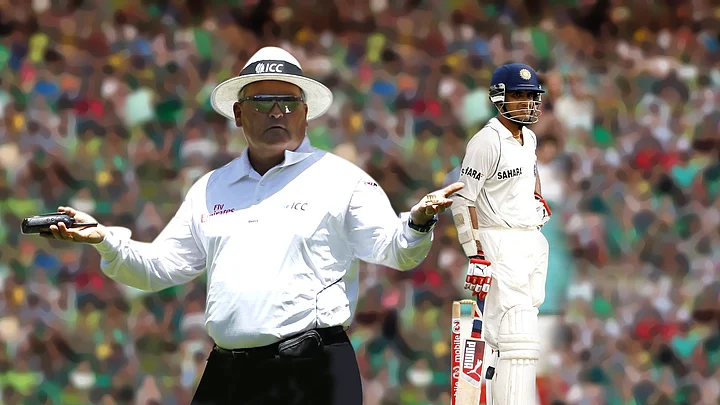Twenty-two cricketers may play the game, but the sport also involves two on-field umpires and a third umpire. In short, there are 25 people who can affect the result of a cricket match.
Over the years, there have been many instances of poor umpiring decisions that meant results went in favour of the wrong team or changed the outcome of the game completely.
Since we can’t expect umpires to be perfect, it’s absolutely normal for one or two incorrect decisions to go through once in a while. However, there have been instances when umpires made several mistakes in a particular match – some of them really bizarre.
The Quint takes a look at five instances in which umpires made inexplicable errors.
1. Sydney Gate, 2007/08
The second Test between India and Australia in 2008, which was played in Sydney, can arguably be called the mother of wrong decisions. Australia won the match by 122 runs but the result could have been different if the umpires hadn’t made as many as NINE wrong decisions in the match.
Andrew Symonds had three lucky escapes on his way to an unbeaten innings of 162, and Michael Hussey was wrongly given not out during his innings of 145* in the second innings.
The other victims of wrong decisions in the match included Ricky Ponting, Sourav Ganguly, Rahul Dravid and Wasim Jaffer.
2. England vs Australia, 1st Test, 2013
England managed to clinch the first Ashes Test in 2013 with a 14-run victory but the result could have been entirely different, if not for a few bizarre umpiring errors.
Mitchell Starc struck Jonathan Trott’s pads in the second innings and appealed for an LBW along with his teammates. After umpire Aleem Dar called it not out, the Australians reviewed the decision.
The decision was overturned by the third umpire Marais Erasmus even after replays showed that Trott had inside-edged the delivery onto his pads. The umpire made the call because there was no trace of the ball hitting Trott’s bat on hotspot.
Then Aleem Dar made an umpiring error. After Stuart Broad clearly nicked the ball to Michael Clarke off Ashton Agar’s bowling, Dar missed the edge and ruled it not out.
3. India vs South Africa, 1st T20, 2015
It was not only JP Duminy’s unbeaten 68 which helped South Africa beat India in the first T20, but also Vineet Kulkarni’s umpiring faux pas.
The scorecard of the match may declare that Duminy remained not out, but that wasn’t actually the case. He was out twice in the match.
When Duminy was batting at five, he was clearly out on Axar Patel’s ball, but was saved by Kulkarni.
By the 17th over, when Duminy was taking South Africa home, Bhuvneshwar Kumar found a way to trap Duminy in front of the stumps, but Kulkarni thought otherwise yet again.
If decisions don’t go in your favour, that also puts pressure and I thought we were unfortunate not to get Duminy.MS Dhoni
4. England vs Australia, 2nd Test, 2005
Billy Bowden’s incorrect decision in the second Ashes Test in 2005 may be one of the costliest errors in the history of the game.
Australia needed three runs to win the Test match and take a 2-0 lead in the series, with Michael Kasprowicz and Brett Lee at the crease.
Kasprowicz tried to fend off a short ball by Steve Harmison and ended up giving Geraint Jones a catch. Jones took a clean catch and umpire Billy Bowden raised his finger.
But, Bowden didn’t notice that Kasprowicz had taken his lower hand off his bat before the ball hit the glove. He was, therefore, not out.
England went onto win the series 2-1 and regained the Ashes after 18 long years!
5. India vs Pakistan, 5th Test, 1987
(Imran Khan begins speaking about the India-Pakistan Test match in the 6th minute of the video)
In the MCC Spirit of Cricket Cowdrey Lecture in 2010, former Pakistan captain Imran Khan spoke about the value of neutral umpires.
Imran narrated an interesting incident, in the fifth Test between India and Pakistan in 1987. After managing to set a stiff target of 221 on a spinning track, Pakistan were ten wickets away from winning their first ever Test series in India. But umpires were in their way.
Imran claimed Pakistan had got Sunil Gavaskar out on a number of occasions but were denied his wicket by the umpires.
Finally, Iqbal Qasim managed to get Gavaskar out for 96, when India had 180 runs on the board and Pakistan managed to win the match by 16 runs and the series 1-0.
(At The Quint, we question everything. Play an active role in shaping our journalism by becoming a member today.)
